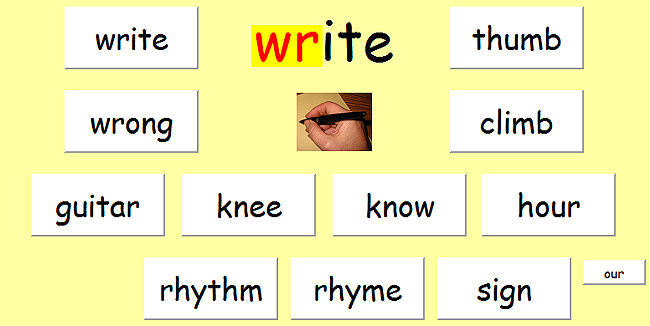 “Silent letters” can be a troublesome topic. Traditionally, people have talked about silent “k” before “n”, silent “w” before “r”, etc. But is it better to teach “wr” and “rh” as alternative ways to make the /r/ sound? It is something that I had not really thought about until recently.
“Silent letters” can be a troublesome topic. Traditionally, people have talked about silent “k” before “n”, silent “w” before “r”, etc. But is it better to teach “wr” and “rh” as alternative ways to make the /r/ sound? It is something that I had not really thought about until recently.
The whole idea of “silent letters” can be confusing and cause difficulty for some students. They misread words because they interpret letters as silent when they are not. So, in version 2.15 of Gilead Success with Phonics, I teach “wr” and “rh” = /r/; “kn” and “gn” = /n/; “mb” and “mn” = /m/; “gu” and “gh” = /g/. (“Wr” & “rh” = /r/ means that “wr” & “rh” sound like /r/ in run. A letter between / / always refers to a sound.)
If you have difficulty seeing this video, try https://youtu.be/LlOjBxSCE0o
But, where did the concept of “silent letters” originate?
- English words have come from many different languages.
- Most silent letters used to be pronounced, but now are not, e.g. know, knock, gnaw.
- Some were not pronounced in the original language.
- Some academics decided that words should reflect their Latin roots, so they added “b” in debt and doubt and “p” in receipt.
- Some letters are pronounced by some people and not by others, e.g. “t” in often.
There are still times when referring to “silent letters” can be useful. Words that have come from French can start with a silent “h” – hour, honest …; end with a silent “s” – debris, chassis …; or end with a silent “t” – depot, ballet, beret … And what about words like rendezvous and faux pas …?
Also, in the word “two” we don’t hear the “w”, but we do hear the “w” in the related words twin, twice, twelve, twenty, between … So what is helpful now in teaching reading and spelling?
Avoiding talk of silent letters wherever possible, at least until well into the process of learning to read, seems to be the best way to go.
Coming soon, I’ll talk about the particular case of silent “e”.
If you want to pursue the topic of silent letters, see https://en.wikipedia.org/wiki/Silent_letter. At the time of writing this article, it clarified many issues for me. Also check out the very interesting website http://www.grammarphobia.com/blog/2007/07/often.html




{ 0 comments… add one now }